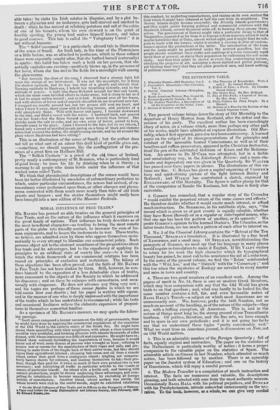MORAL INFLUENCE OF FREE TRADE. * MR. BA1NEs has penned an
able treatise on the general principles of Free Trade, and on the nature of the influence which it exercises on the great family of nations. That influence he truly describes as of the most beneficent character—as tending to bring the most remote parts of the globe into friendly contact, to increase the sum of hu- man enjoyments, and to lessen the incitements to war. These truths, we believe, are admitted even by those who oppose themselves syste- matically to every attempt to liberalize our commercial policy. Such persons object not to the abstract soundness of the propositions about free trade and its advantages, but to the expediency of applying its principles to an artificial state of society like ours—to a state in which the whole framework of our commercial relations has been reared on principles of exclusion and restriction. The fallacy of these objections has been often proved, and the faith of Mr. BAINES in Free Trade has not been shaken by them. Still, however, he con- fines himself to the exposition of a less debateable class of truths, more consonant to the objects of the Society to which he addressed his discourse ; and on these he enlarges with earnestness, and occa- sionally with eloquence. He-does not advance any thing very new; and his topics are perhaps of those cause faciles in which we are told cuivis licet esse diserto ; but his paper is written with vigour, and in the manner of one who is deeply impressed with the importance of the truths which he has undertaken to recommend ; while his taste and occasional liveliness relieve the elaborate expansion of proposi- tions in themselves somewhat familiar.
As a specimen of Mr. BAINES'S manner, we may quote the follow- mg passage.
"Swift never composed a keener sarcasm on the folly of governments, than he might have done by applying the commercial regulations of the countries of the Old World to the embryo states of the South Sea. He might have shown them quarrelling with their neighbours, with whom a close connexion wouldbe very profitable, and forming alliances with islands thousands of miles distant, with whom intercourse was difficult and expensive. He might have ex- hibited them solemnly forbidding the importation of iron, because it would throw out of work some dozens of persons who wrought in bone; refusing to receive tow or canvas for the manufacture of their ropes and sails, and pre- ferring to make them of the fragile bark of their native trees, lest they should injure their agricultural interest ; choosing bad cocoa-nut oil from a remote island, rather than good from a contiguous island; singling out. compara- tively barren shores for colonies, and binding themselves to take their pro- duce, though they paid for it twice as much of their own product:ons as was necessary; and restricting all traffic in particular articles to the vessels or canoes of particular islands. An island with a fertile soil, and teeming with natural productions, might be shown neglecting these advantages, and com- pelling its inhabitants to become manufacturers, by excluding all foreign articles of manufacture. Another island, whose surface was sterile, but whose bowels were rich in the useful metals, might be exhibited retaliating
* On the Moral Influence of Free Trade, and its Effects on the Prosperity of Nations: a Pa_per read before the Leeds Philosophical and Literary Society, 19th February, 1830. By Edward Baiies,jaa. this conduct, by neglecting manufactures, and raising on its own surface the food which it might have obtained at half the cost from its neighbour. The Society Islands might become unsociable; the Friendly Islands quarrelsome; and they might prefer forming political and commercial relations with the Sandwich Islands, several thousand miles off, to forming them among them- selves. The government of Hawaii might take a particular liking to that of Tongataboo, separated as far from it as Europe is fromAmerica,whilst it had a mortal hatred for that of Oahu, almost within sight; and it might bind its sub- jects to trade with the former, whilst it erected a chevaux cle frise of custom- houses against the productions of the latter. The introduction of the loom and the spade might be prohibited under the severest penalties, lest the people should construct their cloths and mattings at a more ruinously rapid speed than at present, or starve their population by cultivating the soil more easily. And thus they might be shown at every step contravening nature, checking the progress of art, indulging a short-sighted and pitiful jealousy, yet blessing their stars that they are plain practical men, and know nothing of political economy."


















 Previous page
Previous page